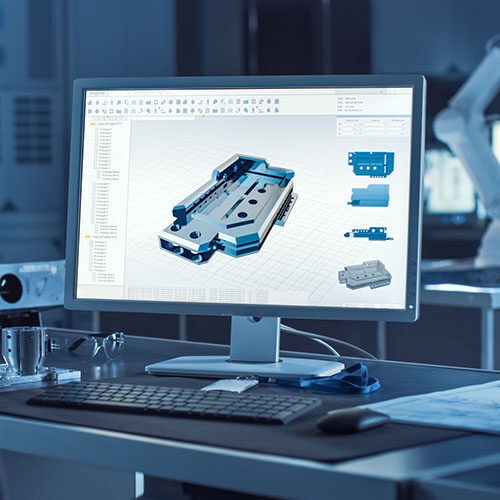
All businesses, including small manufacturing businesses, benefit from having an ERP system.
An Enterprise Resource Planning (ERP) system can manage every aspect of your business, including production, planning, purchasing, manufacturing, sales, distribution, accounting, and customer service — all from one fully-integrated system. An ERP system will help you gain complete oversight of your operations, optimize your business processes, and improve communication across all of your departments.
No Business Is Too Small for an ERP Solution
A common misconception about ERPs is that only large-scale organizations will benefit from them. While it’s true that ERPs were first created to fulfill the demands of big corporations, modern, industry-specific ERPs can assist manufacturers of all sizes in streamlining their operations and centralizing their data.
ERPs let small businesses:
- Increase Productivity: Boost throughput without hiring new staff or expanding operations by automating processes, eliminating redundant work, and increasing shop floor efficiency.
- Share Information: With an ERP, you can connect and integrate all departments in your company, easily sharing data and information between divisions to streamline processes.
- Make Better Business Decisions: Use accurate data and reporting to track progress, productivity, and performance — giving you improved insight into your business for better decision-making.
If you think you are too small for an ERP, think again.
Over 75% of small businesses use ERPs to manage their operations — and you should too.
Manufacturing is an extremely data-intensive industry, so regardless of how big your company is, you will have a lot of data that an ERP can help you make sense of. To maximize productivity in your shop, you must have a handle on what your business has in terms of cash, raw materials, personnel, and production capacity — all of which an ERP can help you with (and no, Excel just doesn’t cut it). All manufacturers need an ERP system to organize and analyze data and help you to effectively communicate and collaborate across your business.
An ERP gives you complete visibility of your operation, providing you with all the knowledge and information you need about your organization and business functions. With an ERP, you will gain visibility into your organization and easily share information and collaborate between departments, allowing you to improve operational efficiency. Your ERP lets you use real-time dashboards to monitor operations and enable you to assess crucial performance indicators with simple-to-read reports — all of which will help you to decide how to best drive your business forward.
4 Tips To Make an ERP Work for Your Small Manufacturing Business
1. Choose Wisely
You need an ERP that works for your business, so you better put in the legwork to choose the right one.
RELATED ARTICLE: How to choose the right ERP for your business
The best bet for a small business: An industry-specific ERP. What this means is you should choose an ERP system that was built for you and your industry. When ERPs started appearing on the market decades ago, they were a one-size-fits-all solution. Companies would invest in a generic ERP and then spend lots of money customizing the system to their specific needs.
But a lot has changed over time, and the modern ERP market is different. Now, hundreds of different ERP systems exist, each tailored to different industries and business needs. Your best bet as a small manufacturing business is to choose one of these systems — one that already has built into it the unique functionalities your business needs.
These ERPs will come loaded with the features you want and can use — like scheduling systems and shop floor management systems — that are designed to meet your needs, with no customizations required. It’s also worth noting that an ERP system that fits your business needs will be easier and faster for you to implement.
2. Identify Your Business Goals
ERPs have a huge range of benefits, and there are so many things you can achieve by using an ERP system — but it can also be overwhelming, especially if you have a small shop and team.
The benefits of an ERP can range from boosting production and efficiency to enhancing and strengthening data security to improving quality management. One of our biggest tips for small businesses is to take the time to identify your goals and what your business wants to accomplish. After you set your goals and priorities, you can focus on how to implement and use your ERP to accomplish your specific goals.
Instead of changing all your business processes at once, tackle your most problematic area first — changing only those processes and implementing only the specific ERP modules that address your worst problem first. After you have achieved your top priority, you can continue to divide your ERP implementation project into stages, focusing on putting the individual features and modules of your ERP system into operation one at a time.
This approach works especially well for small manufacturing businesses with tighter ERP project budgets. With a phased implementation approach, you can get a first-rate manufacturing-specific ERP system at a price and timeline that suits you — while also improving the areas where you need it the most.
An ERP implementation project — especially for a small manufacturer — is not a one-time event. It may take over a year to fully implement an ERP in your shop, so breaking it down into smaller chunks that focus on your priorities is a good way to get the most out of your ERP. You will also need to continue to invest time into learning and training on your system well past the initial implementation phase to get more proficient and take full advantage of your ERP and its benefits.
3. Automate Repetitive Tasks
One of the biggest ways an ERP helps small manufacturing businesses is by optimizing operations through automation.
You can ensure important information is always up-to-date by automating your business routines and procedures, which is especially beneficial for inventory management, order fulfillment, and tracking order statuses.
ERPs can do so many great things for you, like automatically knowing when and how to purchase and manage raw materials to ensure you always have the right level of inventory on-hand. ERPs can provide you with inventory counts in real-time that are always accurate, letting you reliably assign parts to jobs so you can complete more jobs on time.
The reality of running a small shop is that employees wear multiple hats. Everyone pitches in wherever and whenever the need arises (which, as you know, is often). With so much going on, who on your staff has the time to process multiple spreadsheets and separate mountains of data manually?
An ERP system maintains your data in a central location where it is easily accessible by all other team members at any time. Using this data, your ERP can automate daily tasks and reports that free up your time to concentrate on more complex and pressing duties.
4. Take Advantage of Built-in Analytics
Using your ERP’s data analytics features, you can learn more about your customers, your operations, and your past business performance.
A good-quality industry-specific ERP system will allow you to run reports quickly and will have a wide range of valuable and easy-to-understand analytical tools. These tools and reports assist you in gathering, organizing, and analyzing your data to give you a comprehensive view of your whole organization.
You can then plan and strategize how to further improve your business operations using the data and information provided by your ERP. Analytics about your manufacturing processes can assist in improving machine performance, identifying bottlenecks, reducing scrap rates, and improving productivity, which will enhance your efficiency and ultimately boost your profitability.
Guided by your ERP, you can make faster and better business decisions to drive your business forward.
ERP Solutions for Small Manufacturing Businesses
The right ERP for your small business is all about fit, and it will vary depending on your business, industry, size, budget, and needs. What may be the best solution for a large corporation will not necessarily be suitable for your small business. But there will be an ERP right for you — you just need to take the time to find it.
Successful implementation of an ERP system also requires the effort of every person on your team. Every employee can better grasp how the system can benefit their daily duties by being included from the start. This will ensure that everyone in your organization is on-board with the new system and the advantages it can bring — making your implementation process go more smoothly.
ERP systems geared towards small businesses will help you to organize how you source, track, and manage orders to reduce inventory costs and enable smarter purchasing to ultimately let you better manage your cash flow. They will also help you improve your efficiency, increase your throughput, and grow your business.
You no longer need to ask, “is an ERP right for a small business?”. Instead, you can rest assured that an ERP is the best solution to support and manage your manufacturing business.
Curious about how an ERP can help you? Check out our case studies to see how Genius ERP has helped small businesses like yours grow.
Get your eBook Scared to implement a new ERP?
"*" indicates required fields



